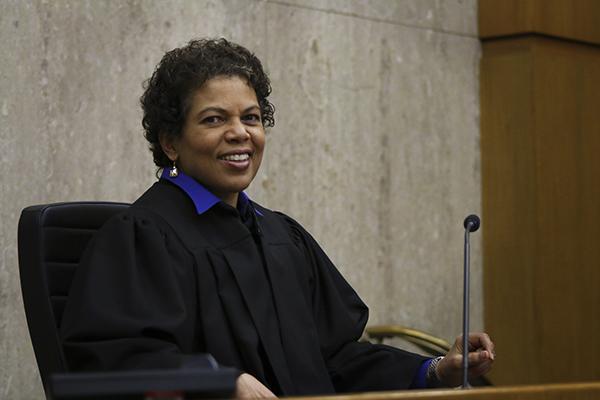An alumna is ruling on federal cases in the same courtroom as one of the biggest legal proceedings in history.
United States District Judge Tanya Chutkan, who graduated in 1983, is one of the only district judges to complete her undergraduate degree at GW. After almost two years of sitting in the same courtroom where the Watergate proceedings took place, Chutkan said she’s realized she can’t solve all of society’s problems from her spot at the front of the courtroom, but has learned to just take one case at a time.
“I have never lost my freedom but I certainly don’t want to, having been in enough prisons and jails,” Chutkan said. “On the other hand, there are people who have done terrible things and are very dangerous to the community, and I took an oath to make the hard decisions.”
President Barack Obama appointed Chutkan to the bench in 2014, making her the third black woman to serve in the D.C. District Court. She said that she mainly works with federal cases like FOIA disputes and spends a great deal of time deliberating before making her decisions.
Chutkan, who is 53, said she was one of the first minority lawyers when she began practicing law in the District in 1987. Still, she said older lawyers looked out for her and other younger minority lawyers.
“People can speak very knowledgeably about world affairs and politics,” Chutkan said. “If you are a minority practicing law, this is a very good town to be in because you weren’t always the only one.”
Chutkan, who grew up in Jamaica, said she applied to GW without her parents knowing and got her acceptance letter while her parents were away in another country. She said that by the time she received her acceptance letter, she only had a week to get to GW.
“My brother and sister and I were staying at home with our aunt and this big fat letter came that had taken weeks to get there, and it was from GW,” Chutkan said. “My brother and sister went out to greet my parents, and they asked, ‘Where is Tanya?’ and my sister said, ‘She went to college.’ My mom burst into tears.”
After graduating from GW, Chutkan received her law degree from University of Pennsylvania. She said that it was a “no-brainer” for her to come back to D.C. after law school because, as an immigrant, living in a city where the people are worldly has made her feel more comfortable.
“You were one of a few, but there were lawyers who were here, who were active, who looked out for younger minority lawyers, and there was a community so that was important as well,” Chutkan said.
Chutkan said the hardest part of her job is sentencing, and that she has to make tough decisions on punishment, deterrence and rehabilitation. She said that, as someone who represented people in jail for many years, she struggles to “find a balance.”
“It really gets to you after a while seeing what feels like an endless parade of young people, young black men especially, go into the criminal justice system,” Chutkan said. “But I didn’t take this job or apply for this job until I felt like I could do all aspects of it – that includes sentencing.”
Chutkan was as a public defender for 11 years, worked in three other law firms and became a partner at Boies, Schiller & Flexner LLP before she came on the bench. Over time, she said that working as a public defender on homicide cases, representing mostly minors and minorities, started to get to her.
From the window of her residence hall to the window in her chambers, Chutkan said she has had the same “only-in-Washington moments” watching protesters right outside the glass.
“They didn’t seem to have any particular cause but they all marched along here and they had lots of police officers and the officers were being very calm,” Chutkan said. “I sat there, I watched, and I thought ‘only in Washington.'”







